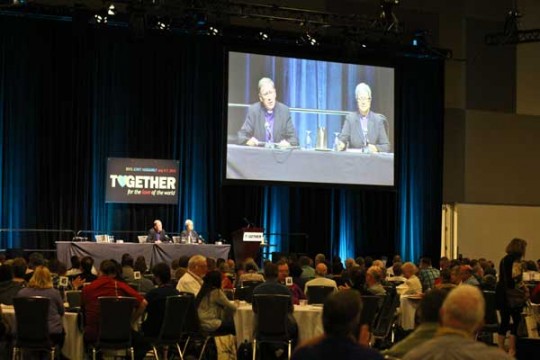Anglican and Lutheran leaders passionate about living out the call to full communion
Categories: Anglican Church of Canada, Evangelical Lutheran Church in Canada

In the spirit of a fully integrated Joint Assembly, National Bishop Susan Johnson of the Evangelical Lutheran Church in Canada and Archbishop Fred Hiltz of the Anglican Church of Canada equally shared the duties of delivering their opening report to delegates of their two churches, who are assembled in Ottawa, July 3-7.
“One of the commitments in Waterloo,” said Archbishop Hiltz, referring to the place where the two churches signed their full communion agreement, “was to hold joint meetings of national, regional, and local decision-making bodies whenever practicable.”
“In that very spirit we come to this Joint Assembly,” he continued, as he explained how the 2013 Joint Assembly will see delegates of the two churches doing most things together and only separate and apart what the two houses must do “in the interests of keeping them each in good order in the service of God’s Mission.”
Together for the love of the world
During their joint report, Archbishop Hiltz and Bishop Johnson drew the assembly into their warm and caring relationship of mutual support.
“Susan and I believe we have been called here,” said Archbishop Hiltz. “We believe we have been prayed here. We believe it is God’s will that we be here, that we be ‘together for the love of the world’”.
The leaders spoke of a regular commitment to monthly telephone calls that they have maintained with each other since being called to their respective positions in 2007.
“It is one way that we have kept in touch about what is happening in each other’s churches,” said Bishop Johnson, “but it is much more than that. It is an opportunity where we take the time to ask about how the other is doing. We know that strengthening our relationship serves to strengthen the relationship between our churches.”
Homelessness and affordable housing
A current area of great concern for both churches is around issues of poverty in Canada and around the world.
Bishop Johnson and Archbishop Hiltz have recently co-signed several letters calling on the Federal government for continued attention to issues relating to poverty and for renewed attention to a comprehensive national housing strategy in co-operation with the provinces and territories.
The leaders are also signatories along with a host of other faith leaders on a letter calling for further action on the Millennium Development Goals. The letter notes that development is working, “the number of people living in extreme poverty has been halved ahead of time and 14,000 fewer children die each day than in 1990,” but challenges remain, as “one in eight people go to bed hungry every night and over two million die of malnutrition each year.”
Delegates to the Joint Assembly were urged “to speak prophetically, engage government in shaping policies that are just and fair for all, and hold elected officials accountable for their pledges.”
On Saturday morning, as a further way of living out the call in this area, youth (some who are delegates of the Joint Assembly and others from the wider community) will lead delegates in an act of public witness, which will take place on Parliament Hill.
Living out the commitment of full communion
Both leaders have placed a high value on living out the commitments of the Joint Anglican Lutheran Commission and feel called to engage the churches in joint work through various expressions.
Several national gatherings have helped to strengthen the union between the two churches. The CLAY (Canadian Lutheran and Anglican Youth) gathering takes place every two years.
“Most of the youth that attend CLAY do not know of a time when our churches were not in full communion,” said Archbishop Hiltz, and they often remind the churches of the relationship by suggesting activities involving members of the other church.
The National Worship Conference also serves as a visible national expression of the joint work of the Anglican and Lutheran churches.
The Anglican Church of Canada supports a gathering of Indigenous Peoples in a Sacred Circle every two or three years. The Circle is centered on story telling and learning from those stories; listening to the wisdom of the elders and acting on that wisdom. National Indigenous Anglican Bishop Mark MacDonald leads this work; the Primate is invited and last year Bishop Johnson was asked to bring greetings at the gathering.
“Our work together with aboriginal peoples is full of great promise,” said Archbishop Hiltz. “We ask the Creator’s blessing to guide us in bringing every bud to glorious flower.”

No comments yet.